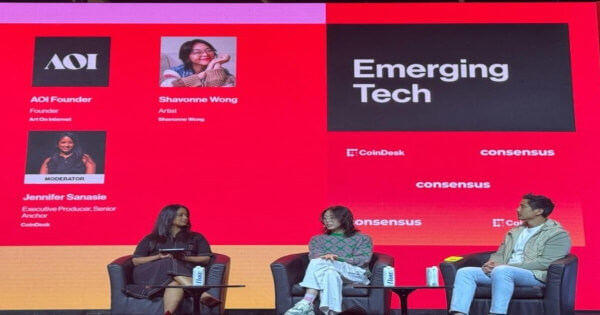Coindesk CONSENSUS 2025 (Part 2) – AI and Blockchain
Khushi
V
Rangdhol
Apr
02,
2025
18:05
AI
and
blockchain
converge,
enabling
decentralized
data
ownership
and
real-time
integration
for
better
predictions.
At
Consensus
Hong
Kong
2025,
one
of
the
most
captivating
discussions
revolved
around
the
growing
convergence
of
artificial
intelligence
(AI)
and
blockchain
technology.
Key
industry
figures,
including
Clara
Tsao
(Founding
Officer,
Filecoin
Foundation),
Jing
Sun
(Co-founder,
IoTeX
&
MachineFi
Lab),
and
Mark
Rydon
(Co-founder,
Aethir),
delved
into
how
decentralized
technologies
could
democratize
AI
and
address
the
trust
issues
surrounding
centralized
data
control.
Decentralized
AI
and
Data
Ownership
Clara
Tsao
explored
the
geopolitical
aspects
of
AI’s
rise,
noting
how
global
powerhouses
like
the
U.S.
and
China
are
vying
for
leadership
in
the
AI
race. “Trust
is
a
big
concern
when
it
comes
to
data
usage,”
Tsao
remarked,
emphasizing
the
growing
need
for
data
ownership.
She
argued
that “decentralized
AI,
where
users
control
where
their
data
is
stored
and
how
it’s
used,
is
essential
to
address
these
concerns.”
Leveraging
blockchain’s
transparency
and
security,
decentralized
AI
models
enable
users
to
retain
control
over
their
data,
resolving
privacy
and
ethical
dilemmas
common
with
centralized
systems.
Decentralized
Infrastructure:
Cloud
Computing
by
the
People,
for
the
People
A
highlight
of
Consensus
HK
2025
was
the
unveiling
of
Aethir’s
decentralized
cloud
infrastructure.
This
distributed
system
allows
developers
to
access
GPU
resources
needed
for
AI
workloads,
democratizing
access
to
high-performance
computing
without
massive
capital
investments.
“We’re
building
a
decentralized
cloud
infrastructure
that
democratizes
access
to
GPU
resources,”
Mark
Rydon
stated.
Aethir’s
platform
taps
into
a
significant
number
of
NVIDIA
H100
GPUs,
providing
AI
startups
with
a
scalable,
affordable
way
to
power
their
projects.
Real-Time
Data:
The
IoT-Blockchain
Integration
Another
important
trend
at
the
conference
was
the
integration
of
real-time
data
into
blockchain
systems,
a
crucial
factor
in
feeding
AI
models
with
current
information.
Jing
Sun
from
IoTeX
explained
how
IoT
devices
are
becoming
increasingly
vital
in
providing
real-time
data.
“Decentralized
networks
are
exploring
ways
to
aggregate
real-time
data
from
weather
stations,
flight
trackers,
and
IoT
devices
to
feed
into
AI
models,”
Sun
remarked.
This
integration
enhances
AI’s
ability
to
make
precise
predictions
and
automate
responses
in
real-time.
For
instance,
weather
sensors
could
trigger
automatic
insurance
payouts
based
on
incoming
data,
showcasing
how
blockchain
brings
transparency
to
AI
applications.
The
Future:
Decentralized
AI
Agents
and
the
Rise
of
the
Autonomous
Economy
The
most
visionary
discussion
at
Consensus
HK
2025
focused
on
the
role
of
AI
agents
conducting
transactions
on
blockchain
networks,
interacting
autonomously
with
one
another.
Panelists
predicted
that
AI
agents
could
eventually
conduct
more
transactions
on-chain
than
humans.
This
shift
toward
AI-to-AI
commerce
marks
a
groundbreaking
development
in
blockchain
and
AI
integration.
These
agents
would
be
able
to
make
decisions,
collaborate,
and
execute
transactions
autonomously,
paving
the
way
for
a
future
where
AI
systems
take
on
complex
tasks
across
industries
such
as
finance
and
transportation.
The
potential
of
decentralized
computing
and
AI
to
reshape
the
digital
economy
is
immense.
By
merging
these
technologies,
a
future
where
individuals
and
businesses
can
access
AI
capabilities
securely,
without
relying
on
centralized
tech
giants,
is
within
reach.
This
convergence
promises
a
new
era
of
transparency,
trust,
and
accessibility
in
AI.
Image
source:
Shutterstock

Comments are closed.